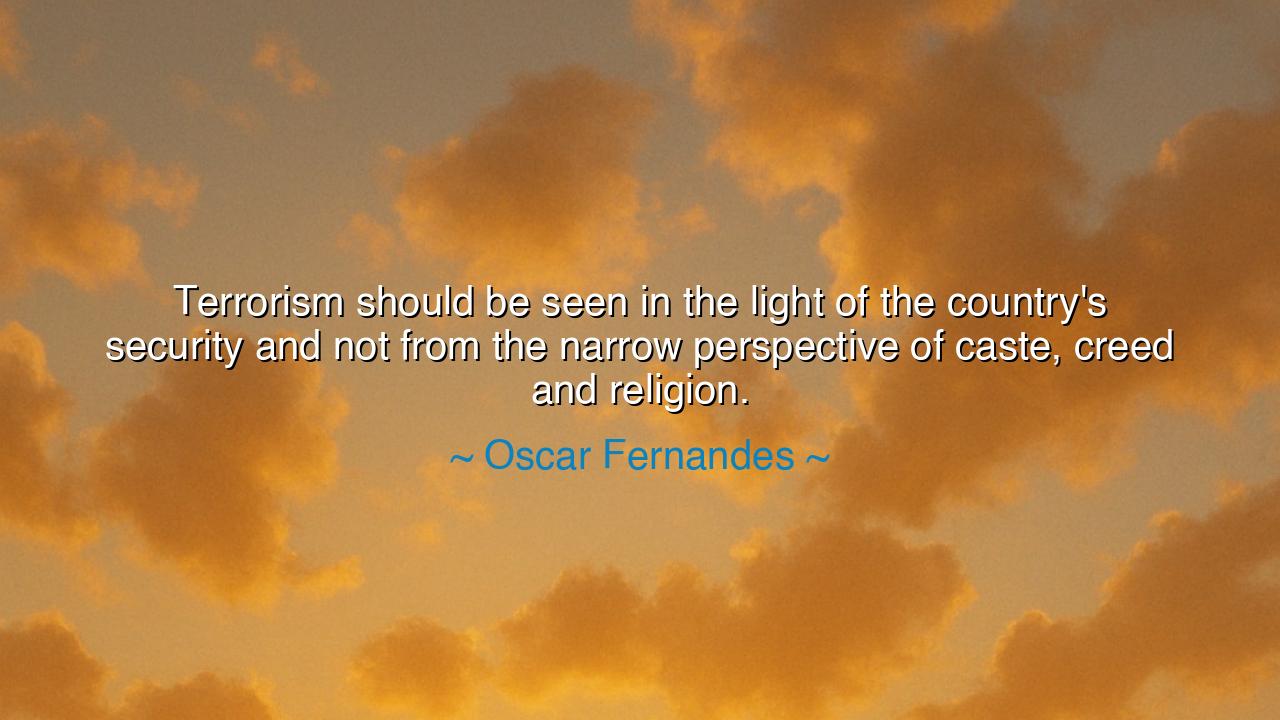
Terrorism should be seen in the light of the country's security
Terrorism should be seen in the light of the country's security and not from the narrow perspective of caste, creed and religion.






"Terrorism should be seen in the light of the country's security and not from the narrow perspective of caste, creed, and religion." – Oscar Fernandes.
In these words, Oscar Fernandes challenges us to rise above the divisive forces that seek to tear our nations apart. Terrorism, that dark force that poisons the spirit of peace and harmony, should never be seen through the lens of caste, creed, or religion. These labels, these barriers of division, only serve to fuel the flames of hatred and discord. Instead, **terrorism must be viewed through the wider scope of national security—the security that ensures the protection of every citizen, regardless of their background. When we fail to see the threat of terrorism as a collective challenge, we invite chaos and division into the heart of our societies.
The ancient philosophers of Greece, such as Plato and Aristotle, spoke of the unity of the state—a society in which every individual, regardless of their personal differences, contributes to the common good. A divided society is vulnerable, for it is fractured by its internal conflicts. It is only when we transcend the boundaries of race, religion, and tribe, and unite in the face of a common enemy, that we can secure peace and stability. Terrorism, as Fernandes wisely points out, is not an issue confined to a single group; it is a threat to the peace and security of all citizens, regardless of their identity.
In history, we have witnessed the tragic consequences of viewing terrorism through narrow lenses. The sectarian violence that ravaged Northern Ireland in the late 20th century was a direct result of viewing the conflict through the prism of religion and identity. The violence between Catholics and Protestants led to decades of suffering, loss, and destruction, all rooted in the belief that one group was superior to the other. This conflict could have been resolved much sooner had leaders chosen to focus on the greater security of the nation, instead of becoming mired in the politics of religious and cultural differences.
The Indian subcontinent, too, provides painful examples of how terrorism has been viewed through the narrow lens of religion and ethnicity. In the aftermath of partition, India and Pakistan were torn apart by sectarian violence, with Hindus, Muslims, and Sikhs suffering terribly. Over the decades, terrorist attacks—whether driven by religious ideologies or ethnic animosities—have plagued both nations. But in recent years, leaders like Oscar Fernandes have called for a new perspective—one that seeks to unite people under the banner of national security rather than divide them through their differences. Only by coming together as a nation can these countries hope to eradicate the scourge of terrorism.
The truth that Fernandes imparts is a truth that has been echoed by great leaders throughout history. Nelson Mandela, in his fight against apartheid, refused to allow the hatred between Africans and Whites to define the future of South Africa. Mandela understood that for a nation to be truly free, all its people must be united against the forces that threaten its stability, whether those forces be racial, political, or religious. Mandela’s call for reconciliation, for a nation to rise above its divisions, is the very essence of what Fernandes speaks of—a call to see terrorism not as a threat to any one group, but to the nation as a whole.
From this wisdom, we can learn that the struggle against terrorism must be rooted in a shared understanding of security and peace. Our differences in religion, race, or belief should never blind us to the common threats that jeopardize the welfare of the entire nation. Terrorism seeks to divide, to sow fear and discord, and if we allow it to fracture our sense of unity, we will never overcome it. Instead, we must stand together, regardless of our backgrounds, and fight for the collective safety and well-being of all.
The practical lesson, then, is clear. When faced with acts of terrorism, we must not let the rhetoric of division take root in our hearts. We must focus on national unity, ensuring that all citizens—whether they are from different religious, ethnic, or cultural backgrounds—are protected equally. Terrorism, no matter its form, must always be confronted as a threat to the nation, and not as a weapon that can be wielded by one group against another. Only through solidarity, understanding, and mutual respect can we hope to build societies that are truly secure and peaceful for all.






AAdministratorAdministrator
Welcome, honored guests. Please leave a comment, we will respond soon